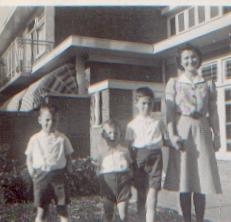
Steven Frank BEM
Steven Frank was born in Amsterdam in the Netherlands. In 1940 when he was five years old the Nazis invaded and occupied the country. His life and that of his two brothers changed very quickly because they were Jewish. His parents were not religious and thought of their identity as Dutch (although his mother was from England), but to the Nazis that made no difference.
I was suddenly different from all my other friends. I was no longer allowed to play in the park, my father could not take public transport to work; I couldn’t go into the swimming pool or the zoo.

Steven with his family in 1937
Steven’s father, Leonard Frank, was a lawyer. He was only in his thirties but well respected and worked closely with the Amsterdam authorities. Leonard Frank sat on the board of a large hospital for the mentally ill. When the Nazis invaded, the family had offers to help them escape to Britain, but Leonard Frank was worried about the patients and refused to flee. Instead he became involved with underground activities. Steven’s father spoke out publicly against the Nazi authorities as well as working covertly to help those they threatened. As a lawyer and a well respected member of the community, Leonard Frank wrote letters on behalf of Jews arrested by the Nazis asking for better treatment and for them not to be deported to the ‘East’.
The whole family suffered under the restrictions, people they knew were arrested and others fled into hiding. At various times people were even hidden at the Frank’s house – a very risky thing for a Jewish family to do. Steven’s father and mother were determined to do something and to speak up for those that needed it.
In December 1942 Leonard Frank set off for work as usual (by bike as Jews were not allowed to use other forms of transport), but he never returned home. He was arrested by the Nazis and sent to a prison where he was interrogated for his underground activities. Just as Leonard Frank had spoken out for others some brave non-Jewish friends spoke out for him. One of the men who risked their own positions by pleading for their friend was Arnold D’Ailly, a banker who after the war went on to become the mayor of Amsterdam.
Shortly after his father’s arrest Steven, his mother and his brothers received notice that they were to be sent away. First they were sent to a prison camp for privileged prisoners because of Leonard’s connections but eventually the four of them were sent to Westerbork.
Westerbork camp was a transit camp – a holding place from where Dutch Jews were held until they were deported to camps in Eastern Europe, often to Auschwitz-Birkenau, the largest Nazi killing camp.
After a number of months living in Westerbork transit camp watching their friends and loved ones loaded onto trains and sent away, the Frank family were deported to Theresienstadt ghetto camp in occupied Czechoslovakia in September 1944. Theresienstadt was an old disused barracks and despite containing many permanent buildings, people were still forced to live in terrible conditions with little food or access to water.
By the time they arrived at Theresienstadt it was very overcrowded and disease flourished, killing thousands of people. Steven’s survival owed much to his mother. She got herself a job in the camp’s hospital laundry, one of the few places with regular (hot) water. She secretly washed people’s clothes in exchange for scraps of bread which she mixed with hot water and took to her sons in a tin saucepan as a ‘bread porridge’ – giving them some additional strength with their own rations.
For many Theresienstadt was just a stopping point – those that did not die from disease were usually transported to other camps to be gassed. The transportations happened regularly and Steven remembers the horrible scenes when the Nazis intentionally split up families so that those who were not taken on the transportation were mentally tortured with the knowledge of what might be happening to their loved ones.
Fortunately for Steven, the war ended before they were deported. He and his brothers are three of only 93 children who survived Theresienstadt out of the 15,000 children who were sent there.
After the war Steven, his brothers and mother moved to England to try and rebuild their lives.
Steven never saw his father after he was arrested. Leonard Frank was deported from the prison in the Netherlands to Auschwitz-Birkenau in occupied Poland, where he was gassed. He was only 39 years of age.
Today, Steven tells his story and that of his family to groups all over the UK. Steven uses his voice to speak out for the children that didn’t survive so that they will be remembered and so that the actions of those who did speak out against the Nazis, like his father, will not be forgotten.


